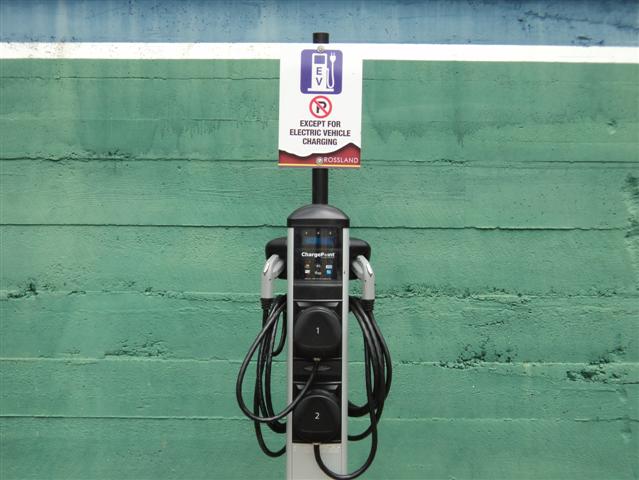Rossland gets a jump start on an electric future
The two electric vehicle charging stations outside of the thrift store are up, running, and ready for action. The stations are ‘level 2’, which means they use 240 volt chargers. A 100% electric vehicle will take approximately 6-8 hours to fully charge. This is the result of an initiative that was started by the Sustainability Commission’s Energy Task Force in August of last year. With the support of council, the city applied for, and was awarded a grant from the BC plug-in program.
According to their website, Plug In BC is an initiative led by the Province of BC, in collaboration with BC Hydro and others, to lay the groundwork for plug-in electric vehicles and related electric charging infrastructure. A cornerstone is the Community Charging Infrastructure (CCI) Fund, which is helping to build a network of 570 charging stations across BC for use by the public and fleets. The Fund is overseen by the BC Ministry of Environment and BC Ministry of Energy and Mines, and administered by the Fraser Basin Council. The web of charging stations is necessary, in order to increase the range of electric vehicles and thus, make them a viable transportation option.
Being a part of this initiative puts Rossland ahead of the curve in regard to moving toward alternative fuel sources. “The cost of electric vehicles continues to fall, relative to gas powered vehicles,” says Steve Ash, chair of the Sustainability Commission’s Energy Task Force. “In Rossland, we are eager to implement a car share program, and the second phase would be to incorporate an electric car to the fleet.”
The move is also good publicity for the City of Rossland. Now that we are part of the electric charging grid, people travelling via electric vehicle will now be stopping in town and spending time here. As the popularity and feasibility of electric vehicle options grow, it will only serve to bring more people to Rossland and increase tourism.
“Some of us are very excited as to the options that these developments offer, which in the longer term will very viably enable us all to reduce our dependence on carbon based energy supply,” said Ash. He is growing his own fleet of electric vehicles, which are currently aiding in various aspects in his business at Red Mountain Village. “We presently use a couple of electric vehicles and they have enabled us to use the gas station less often.”
However, with some of these vehicles being ‘low speed’ electric vehicles, they are not yet legally permitted on Municipal roads in Rossland. This speaks to the need to develop infrastructure that helps facilitate owning and operating electric vehicles, as many municipalities have adopted bylaws that allow ‘low speed’ EVs on municipal roads, but Rossland has not considered it yet.
The future looks bright for electric vehicles, with a web of charging stations going up all over B.C., Canada, and the U.S. “Changing our dependence on petroleum based vehicles was always going to be a major challenge, due to the extraordinary infrastructure that has been built up to support their hugely reliable use,” said Ash. “Hence, the installation of charging stations must be considered in the context of a long term vision to enable this alternate form of vehicle transportation.”


























Comments